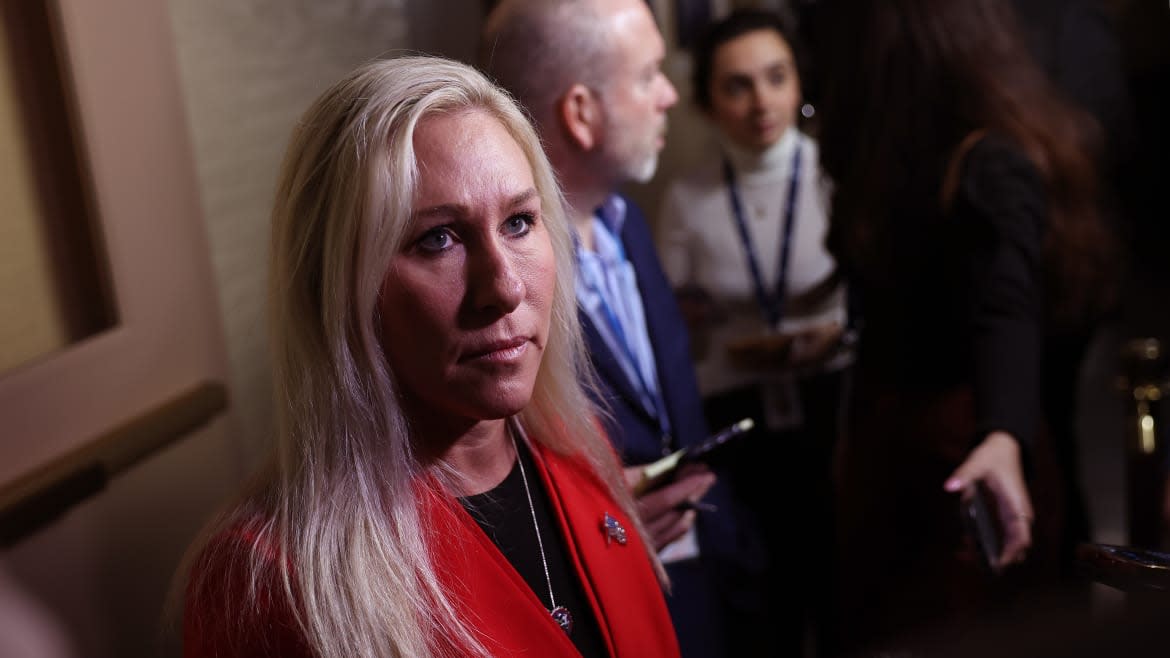MTG’s Recusal Demand of Judge in Fani Willis Case Shredded by Legal Experts

An apoplectic Rep. Marjorie Taylor Greene (R-GA) complained on Friday that Judge Scott McAfee should have recused himself in the Fani Willis case because he once “worked for” the Fulton County district attorney and donated to her campaign.
The MAGA congresswoman’s arguments were summarily dismissed by legal experts, however, who noted that Greene did not cite a “sufficient basis for judicial recusal” and that McAfee’s ruling was highly critical of Willis’ “unprofessional” behavior.
Following Willis’ combative testimony in which she defended her romantic relationship with the special prosecutor she assigned to the election interference case against Donald Trump, McAfee ruled that there was a “significant appearance of impropriety that infects the current structure of the prosecution team.” He added that it could only be resolved if one of them left the case, resulting in Nathan Wade tendering his resignation hours later.
McAfee also admonished Willis not only for her fiery courtroom testimony last month but also for her January speech at an Atlanta church where she suggested she was being targeted because of her race. “This finding is by no means an indication that the court condones this tremendous lapse in judgment or the unprofessional manner of the District Attorney’s testimony during the evidentiary hearing,” he declared.
In the end, though, Willis is allowed to remain on the Trump criminal case—and that decision did not sit well within MAGA circles. Greene, however, was particularly outraged.
“Judge McAfee worked for Fani Willis and donated to her campaign AND has now ruled that Fani can keep prosecuting Trump but only if she removes her lover Nathan Wade off the case!” Greene posted on social media shortly after McAfee released his ruling. “Judge McAfee should have recused himself in the first place because of his obvious bias. Fani Willis lied under oath in his courtroom!”
She continued: “Fani and Wade conspired with the Whitehouse and Jan 6th Committee, talk about RICO charges! Fani Willis overpaid her lover Nathan Wade as he had zero experience with RICO cases, abuse of taxpayer funds! And the Georgia Ethics board needs to seriously investigate both Fani Willis and Nathan Wade, I’ve filed multiple complaints! The corruption in Fulton County, Georgia is some of the worst in the nation. It makes most of us in Georgia sick.”
Lawyers and legal experts, however, took umbrage with Greene’s assertion that McAfee had a conflict of interest in the case and should have recused himself.
“Sigh. Judge McAfee donated a small sum to Fani Willis’ campaign in 2020—*before* he was appointed to the bench,” Lawfare legal fellow and courts correspondent Anna Bower tweeted. “Georgia courts have held that nominal campaign contributions are an insufficient basis for judicial recusal. There’s no basis for McAfee to recuse.”
Bower also addressed Greene’s accusation that McAfee worked for Willis in the past. “Yes, Scott McAfee worked in the same office as Willis before he became a judge. (That was long before Willis ran for DA.),” she wrote. “Again, not a sufficient basis for judicial recusal, as the Georgia Supreme Court has held!”
One of the 34-year-old judge’s first jobs after he left law school was with the Fulton County District Attorney’s Office. According to the New York Times, McAfee was soon “promoted to the complex trial division,” which was led by Willis at the time. By the time Willis became the district attorney, McAfee had left the office to become a judge. At the same time, during his tenure at law school, he was the vice president of the conservative law group Federalist Society and was treasurer for the Law Republicans.
“The order strongly, strongly implies that Wade and Willis lied under oath,” lawyer Andrew Fleischman reacted to Greene’s claim. “You would not write these things about someone you were sucking up to.”
Law professor Anthony Michael Kreis, meanwhile, added that it was fairly obvious that McAfee’s small campaign contribution had no bearing on his ruling, and that it wasn’t a reason to call for his recusal.
“A de minimus contribution before accepting a judicial seat is not a due process issue,” Kreis posted. “Judge McAfee has been extremely cautious, methodical, and thorough. There is zero basis to believe he hasn’t been playing this down the middle even if you disagree with some of his decisions.”
Get the Daily Beast's biggest scoops and scandals delivered right to your inbox. Sign up now.
Stay informed and gain unlimited access to the Daily Beast's unmatched reporting. Subscribe now.


